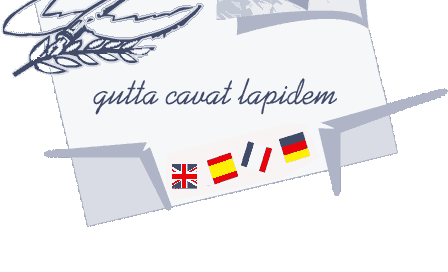PERCEPTIONS OF HISTORY
-- THE "DISCOVERY" OF AMERICA:
What is History and what uses does it have? As Herodotus noted, history-writing, means "inquiry", a thought further developed and applied by Thucydides. Ideally, History should be a contextual timeline of
true events, reflecting the five "C-s"of historical analysis -- chronology, comprehensiveness, context, causality and comparison. Yet, as can be easily demonstrated, historians throughout the ages have manipulated the
record -- primarily by omitting crucial facts, sometimes by inventing
them, a phenomenon attributable to opportunism, career expectations, political correctness, literary enthusiasm, poetic license
(se non è vero è molto ben trovato!), optimism (feel good stories), and even
greed. Let's face it, many historians -- like lawyers -- write
what they believe is expected of them, or what will render social and economic benefits. This is why
historical accounts that raise uncomfortable questions, upset the
established order, i.e. are not black and white, neatly separating
good and bad, heroes and villains, are seldom written, and if written,
are difficult to place with commercial publishers, are often marginalized and ignored by the corporate press.
Let us now revisit a major historical event
that is mostly perceived as a success story, a romantic adventure,
the winning of the golden West, i.e. the classical caricature known
as the "discovery" of America.
Now, did the Europeans really "discover" an
empty continent, which they then settled and developed, or were
our ancestors more like "migrants" to new frontiers?
Throughout history, migration has been a natural behaviour of
the human species, hardly "deviant conduct". Yet, one
of the many differences between 21st century migrants and 16th-20th
century migrants is that 21st century migrants do not come to
destroy our crops, slaughter our buffalo or wipe us out. Basically,
all that modern migrants (we often call them "illegal aliens")
want is a better chance for themselves and their families.
Let us look at Europe during the "age of
discovery". Our European ancestors were pretty poor, our cities
were squalid, overcrowded, unemployment and disease were rife. The
16th, 17th, 18th. 19th century migrants -- the Spanish, the Portuguese,
the British, the French. the Germans, the Poles, the Irish and other "colonizers"
-- were adventurers, mavericks bent on getting rich fast, followed by simple
folk hoping for a new start. The historical fact is that what we
know today as North Armerica (the Western hemisphere north of the
Rio Grande) was a rich land, ecologically-balanced, populated by
some 10 million human beings, minding their own business and posing
no threat to Europeans, when in 1492 Christopher Columbus landed on Guanahani, an Island in the Bahamas, thinking that he had found a western route
to India. Columbus went on to Cuba and the Antillies, conducted in all four voyages to the Americas, still thinking that the inhabitants were "Indians".
Unlike the Spaniards who "Christianized" the indigenous popultions and used them as cheap labour, our Anglo-Saxon forebears had little use for the
natives, whom they referred to as "devils" and
"wolves". The Massachusetts Puritans, who also burned
witches, killed the native "Indians" who taught them how
to survive, while the Reverend John Cotton of the first Church of
Boston, and the Reverend Cotton Mather of the Second Church of Boston
held their racist, rabble-rousing sermons worthy of a Julius Streicher.
In the course of three centuries 98% of the native North American
population was not only displaced pursuant to the official policy
of "manifest destiny" -- it was deliberately exterminated.
The founding fathers of the "land of the free and the home
of the brave", Benjamin Franklin ("the design of Providence
to extirpate these savages"), George Washington ("beasts
of prey") , John Adams ("blood hounds"), Thomas Jefferson
("merciless Indian savages"), James Madison, James Monroe,
Andrew Jackson ("the wolf be struck in his den")-- all
called for the extinction of the American "Indian". These dreadful historical facts lie sleeping in the archives, if
anyone cares to consult them. But most historians and the mainstream media seem only to remember
"Thanksgiving Day" and the story of Pocahontas.
What we know as Meso-and South America, was also
a rich land, densely populated with some 70 million human beings,
with magnificent cities like Tenochtitlán (today Mexico
City), capital of the Aztec kingdom, with towns, villages, impressive
architecture, acqueducts, sports facilities, science, astronomy,
art, and vast agricultural lands producing such wonderful foods
as avocado (aoacatl in Aztec, originating in the Tehuacan valley near Oaxaca), beans, blueberry, cacao, cashews, cassava, cayenne pepper, chilli peppers, cranberry (native to the region around Edmonton, Alberta, in Canada), gourds, jalapeños,
maize (mahiz in Arawak language, commonly
known as corn), maple sugar and maple syrup (produced by the Ojibwe and Algonquin peoples of Northeast Canada), passion fruit, peanuts, pecans, pineapple, quinine (tonic water!), sunflowers (helianthus), sweet pimentos,
potatoes (papa or patata in Inca language),
pumpkin, squash, tapioca, tomatoes (tomatl in
Nahuatl language), topinanbour, vanilla, "wild rice" (anishinaabe manoomin, hand-harvested by Anishinaabe peoples in central-north America), zucchini, etc., not to mention that very bad import to Europe -- tobacco (from
the Arawakan or Taino word referred to by the Dominican friar, later Bishop Bartolomé de Las Casas), hitherto
unknown in Europe (until introduced in Spain in 1558
by Francisco Fernandez).
As we can read in the writings of Las Casas, our Spanish
ancestors brutally aggressed the indigenous population, murdered
and enslaved millions of the men, raped their women, and eventually
mixed with the suvivors to create the "mestizo" society
we know in Latin America today. If you travel to Mexico, Guatemala, El Salvador, Nicaragua,
Colombia, Venezuela, Ecuador, Peru, Bolivia -- you will see the descendants of the Aztecs, the
Mayas, the Incas. Presidents Toledo of Peru, Chavez of Venezuela
and Evo Morales of Bolivia have Spanish surnames, but they certainly
also have as many indigenous forefathers (a mucha honra!). So much
for the "discovery" of the Americas and for the legal
fiction of "terra nullius".
It is worth remembering that, far from being xenophobic,
the first nations of the Americans received Cristobal Colon with
remarkable hospitality, as Columbus himself acknowledged in his writings. -- The European newcomers, however, were
migrants with the sword. Perhaps the only good thing that can
be said for Spanish colonization is that the human rights activities
of Friar Antonio de Montesinos ("are these not also men"?)
and Bartolomé de las Casas before Emperor Charles V led to the
adoption of the "New Laws" of 1542 which recognized
the human nature of the indigenous population and forbade their
ill-treatment and enslavement. The great disputations of Valladolid
and Salamanca have gone down in history as a milestone in the
development of the concept of human rights. Admittedly, Charles'
laws were violated with impunity, which only illustrates the
truism that norms and their enforcement are not identical. Yet,
if we had no norms, we would be totally subject to the law of
the jungle, otherwise known as "might is right". (Bartolomé de las Casas, Brief
History of the Devastation of the Indies, Johns Hopkins University
Press, 1992; David Stannard, American Holocaust, Oxford
University Press, 1992; Richard Drinnon, Facing West,
University of Oklahoma Press, 1997; Frederick Hoxie (ed.) Encyclopedia
of North American Indians, Houghton Mifflin Co., Boston,
in particular the entry "Population: Precontact to Present",
pp. 500-502 by Russell Thornton, UCLA), Francis Jennings,
The Invasion of America, Chappel Hill, University of
North Carolina Press, 1975. Nicholas Guyatt, Providence
and the Invention of the United States, Cambridge 2007.
R. W. van Alstyne, The
Rising American Empire, Oxford 2010, Reginald Harsman,
Expansion and American Indian Policy 1983-1812, East
Lansing Michigan State University Press, 1967. Noam Chomsky, Hopes
and Prospects, Penguin 2010, pp. 16-24.
I cannot help wondering how our world would look
if instead of the Europeans "discovering" America, the Iroquois,
the Cree, the Dakotas, the Aztecs, the Incas, the Arawacs had crossed
the Ocean to "discover" Europe. Would they have
slaughtered the Europeans, as our ancestors slaughtered them?
|






